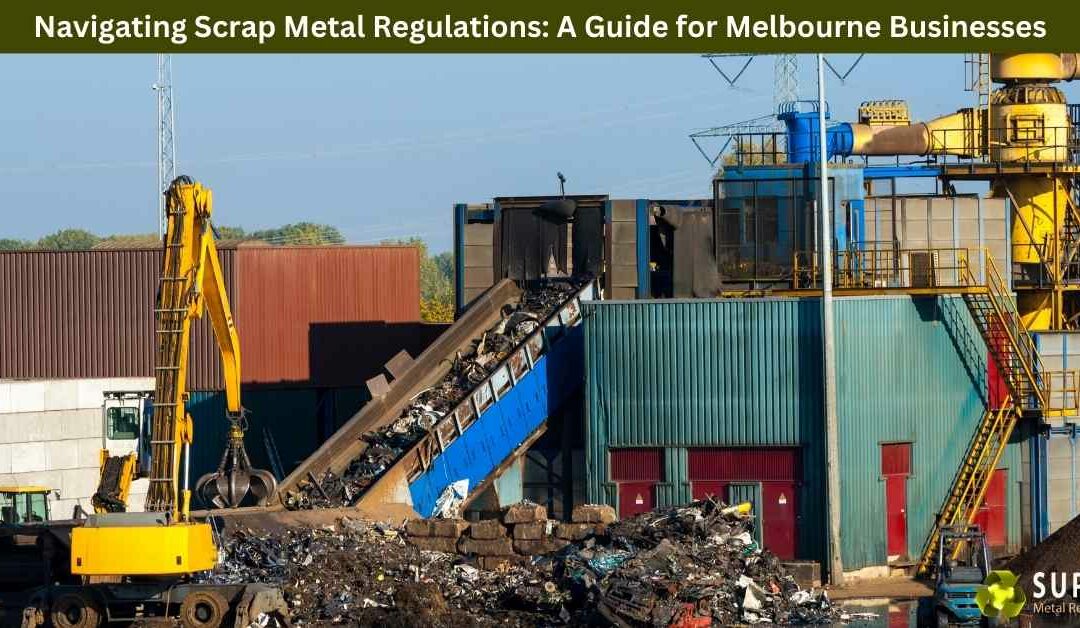For businesses involved in the scrap metal industry in Melbourne, understanding and complying with regulations is crucial. These regulations ensure the safe, ethical, and environmentally responsible management of scrap metal. Non-compliance can result in significant penalties and damage to a company’s reputation. This guide provides an overview of key regulations affecting the scrap metal industry in Melbourne and offers practical advice for businesses to navigate these requirements effectively.
Understanding the Regulatory Landscape
Scrap metal businesses in Melbourne operate within a framework of local, state, and federal regulations. These rules are designed to prevent illegal activities, protect the environment, and ensure public safety.
Key Regulatory Bodies
- Environmental Protection Authority Victoria (EPA Victoria): The EPA oversees regulations related to environmental protection, including waste management and pollution control.
- Victoria Police: The police play a crucial role in regulating scrap metal transactions to prevent theft and illegal trade.
- Australian Government: Federal regulations, such as those pertaining to the handling of hazardous materials, also impact the scrap metal industry.
Major Regulations Affecting Scrap Metal Businesses
1. Environmental Regulations
Waste Management and Recycling Act 2011: This Act governs the management of waste, including scrap metal. It emphasizes the reduction, reuse, and recycling of waste materials to minimize environmental impact.
- Requirements:
- Proper storage and disposal of scrap metal.
- Implementation of waste reduction and recycling programs.
- Regular reporting on waste management practices.
Pollution Control: Scrap metal businesses must adhere to strict pollution control measures to prevent contamination of air, soil, and water.
- Requirements:
- Installing pollution control equipment.
- Regular monitoring and reporting of emissions.
- Implementing spill prevention and response plans.
2. Occupational Health and Safety (OHS) Regulations
Occupational Health and Safety Act 2004: This Act outlines the responsibilities of businesses to ensure a safe working environment for employees.
- Requirements:
- Conducting regular risk assessments.
- Providing appropriate personal protective equipment (PPE).
- Ensuring proper training and supervision of workers.
3. Anti-Theft and Transaction Regulations
Scrap Metal Industry Act 2016: This Act aims to prevent the theft and illegal trade of scrap metal by imposing stringent requirements on transactions.
- Requirements:
- Keeping detailed records of all transactions, including the identity of sellers and the description of materials.
- Installing and maintaining surveillance systems at business premises.
- Reporting suspicious activities to authorities.
Identity Verification: Businesses must verify the identity of individuals selling scrap metal to deter illegal activities.
- Requirements:
- Collecting and storing copies of identification documents.
- Maintaining a register of all transactions.
Practical Steps for Compliance
1. Stay Informed
Keeping up-to-date with regulatory changes is essential. Subscribe to updates from regulatory bodies such as EPA Victoria and industry associations to stay informed about new requirements and best practices.
2. Implement Robust Record-Keeping
Accurate record-keeping is vital for compliance with transaction regulations and environmental reporting. Use digital systems to track transactions, inventory, and waste management activities.
- Tips:
- Invest in specialized software for managing scrap metal transactions.
- Train staff on proper record-keeping practices.
- Conduct regular audits to ensure accuracy and completeness.
3. Develop Comprehensive Policies and Procedures
Establish clear policies and procedures to guide your business operations in compliance with regulations.
- Tips:
- Create a compliance manual detailing all regulatory requirements and procedures.
- Ensure all employees are familiar with and follow these procedures.
- Regularly review and update policies to reflect changes in regulations.
4. Train Employees
Training is crucial for ensuring that employees understand and comply with regulations. Provide ongoing training sessions on regulatory requirements, safety practices, and ethical conduct.
- Tips:
- Schedule regular training workshops and refresher courses.
- Use a mix of training methods, including in-person sessions, online courses, and hands-on demonstrations.
- Evaluate the effectiveness of training programs through assessments and feedback.
5. Invest in Technology and Equipment
Modern technology and equipment can enhance compliance efforts by improving efficiency and accuracy in managing scrap metal operations.
- Tips:
- Install surveillance systems to monitor transactions and deter illegal activities.
- Use pollution control equipment to minimize environmental impact.
- Implement digital systems for tracking and reporting waste management activities.
6. Engage with Industry Associations
Joining industry associations can provide valuable support and resources for navigating regulatory requirements. Associations often offer training, advocacy, and networking opportunities.
- Examples:
Case Study: Best Practices in Compliance
EcoScrap Pty Ltd: EcoScrap Pty Ltd, a leading scrap metal business in Melbourne, has successfully navigated regulatory requirements through proactive measures and a commitment to sustainability.
Key Practices
- Comprehensive Training Program: EcoScrap provides regular training to all employees on safety, environmental regulations, and transaction compliance.
- Advanced Technology: The company uses advanced software for transaction tracking and inventory management, ensuring accurate record-keeping and reporting.
- Sustainable Operations: EcoScrap has implemented state-of-the-art pollution control equipment and robust waste management practices, significantly reducing its environmental footprint.
- Community Engagement: The company actively engages with local communities and authorities, participating in initiatives to promote recycling and environmental conservation.
Conclusion
Navigating the complex landscape of scrap metal regulations in Melbourne requires diligence, knowledge, and a proactive approach. By staying informed, implementing robust policies and procedures, investing in technology, and engaging with industry associations, businesses can ensure compliance and thrive in the scrap metal industry. Adopting best practices not only helps avoid penalties but also enhances reputation, operational efficiency, and sustainability. As the industry evolves, continuous improvement and adaptation will be key to maintaining compliance and achieving long-term success.
If you are in Clayton South, Victoria 3169, and looking for a metal recycling service, this is the best way to visit us.
Super Metal Recycling
345 Frankston – Dandenong Road, Dandenong South VIC 3175
(03) 9706 4909


Recent Comments